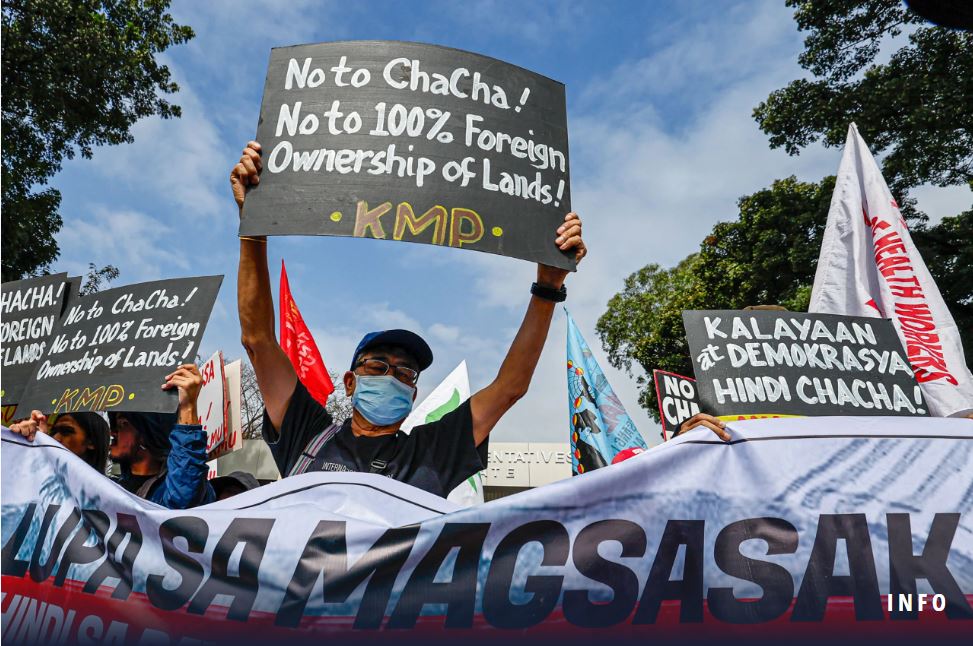
Remember the time when Filipinos read about this e-mail chain, that supposedly came from a Filipino tabloid spread, which tells of Tommy Hilfiger purportedly saying that had he known that Black people and Asians would buy his clothes, he never would have made them so nice? How about the time when Teri Hatcher’s character in the hit show Desperate Housewives said, “Can I check those diplomas? Because I want to make sure they’re not from some med school in the Philippines!”? Then of course, how about that time when Will Ferrel’s character in the movie, ‘Anchor Man 2’ said that the “Only Olympic sport Filipinos are good at is eating cats and dogs.”? Notice that even though the Hilfiger email was a hoax and that Hatcher’s and Ferrel’s lines were just from some stupid comedy shows, Filipinos are so quick to get riled up for being victimized by what they perceive as “racism”. So, I wonder how Filipinos feel about themselves being racist against foreigners when it comes to business?
The latest Pulse Asia survey result seems to suggest that when it comes to lifting foreign ownership restrictions in the 1987 Constitution, for Filipinos, it is A-Ok to discriminate based on race or ethnicity. Never mind that the survey also revealed that 75% to 79% of Filipinos have little or no knowledge about the 1987 Constitution at all, it begs to ask: “Do Filipinos in the Philippines even know what they like about the present Charter regarding economic foreign ownership restrictions?” I mean do their lives suck less if their boss is a “De la Cruz” rather than a “Gupta”, an “Abdhullahi”, a “Kobayashi”, a “Smith” or a “Brzezinski”?
The 1987 Constitution is “supposed” to guarantee the protection of rights and freedoms under the “Equal Protection Clause”. This means, in theory, that:
| SUPPORT INDEPENDENT SOCIAL COMMENTARY! Subscribe to our Substack community GRP Insider to receive by email our in-depth free weekly newsletter. Subscribe to our Substack newsletter, GRP Insider! Learn more |
“No person shall be deprived of life, liberty, or property without due process of law, nor shall any person be denied the equal protection of the laws.”
 Now, of course this is entirely theoretical in nature because let’s face it, if you’re just a two-bit Totoy Pototoy, do you really think you can ever be equal in the eyes of the law if you are up against an Ayala, a Villar, a Marcos, or a Duterte? When was the last time you heard a Duterte defend a two-bit punk for suspected use and sale of drugs on the street? However, I do know at least one Duterte who has passionately defended someone filthy rich indicted for conspiracy to engage in sex trafficking by force, fraud and coercion and sex trafficking of children; conspiracy; and bulk cash smuggling. Well, at least for narcotics use and peddling as well as fraud and sex crimes, the law affords people to pretend that there is equality. However, when it comes to business, the law of the Philippines does not make any bones about its discriminatory trait! Supporting jurisprudence states that:
Now, of course this is entirely theoretical in nature because let’s face it, if you’re just a two-bit Totoy Pototoy, do you really think you can ever be equal in the eyes of the law if you are up against an Ayala, a Villar, a Marcos, or a Duterte? When was the last time you heard a Duterte defend a two-bit punk for suspected use and sale of drugs on the street? However, I do know at least one Duterte who has passionately defended someone filthy rich indicted for conspiracy to engage in sex trafficking by force, fraud and coercion and sex trafficking of children; conspiracy; and bulk cash smuggling. Well, at least for narcotics use and peddling as well as fraud and sex crimes, the law affords people to pretend that there is equality. However, when it comes to business, the law of the Philippines does not make any bones about its discriminatory trait! Supporting jurisprudence states that:
“The equal protection of the law clause is against undue favor and individual or class privilege, as well as hostile discrimination or the oppression of inequality. It is not intended to prohibit legislation which is limited either [by] the object to which it is directed or by [the] territory within which it is to operate. It does not demand absolute equality among residents; it merely requires that all persons shall be treated alike, under like circumstances and conditions both as to privileges conferred and liabilities enforced. The equal protection clause is not infringed by legislation which applies only to those persons falling within a specified class, if it applies alike to all persons within such class, and reasonable. grounds exist for making a distinction between those who fall within such class and those who do not.”
The reason why foreigners have so many restrictions in doing business in the Philippines is because foreigners are not deemed as equals among Filipinos in the Philippines. Under the law, preferential treatment is given to Filipinos and foreigners cannot demand equality with them! Under the current law, the following are examples of restrictions that apply to foreigners:
1. Foreigners are not allowed to own a business under a Sole Proprietorship structure
2. Foreigners are only allowed up to 40% ownership in a Partnership business structure
3. Foreigners are only allowed up to 40% ownership in a corporation
4. Foreigners are not allowed to have equity on small-scale mining
5. Foreigners are not allowed to have equity on practice of professions
6. Foreigners are only allowed 20% equity on private radio communication network
7. Foreigners are only allowed 25% equity on construction and repair of locally-funded public works (except infrastructure/development projects covered under RA 7718)
8. Foreigners are only allowed 40% equity on educational institutions
9. Foreigners are only allowed 40% equity on businesses focused on culture, production, milling, processing, trading excepting retailing, of rice and corn and acquiring, by barter, purchase or otherwise, rice and corn and the byproducts thereof
10. Foreigners are only allowed 40% equity on businesses focused on the supply of materials, goods and commodities to government owned or controlled corporation, company, agency or Municipal Corporation.
Now if you are a foreign investor, would you be willing to invest your hard-earned money in a foreign environment where you absorb high risk in exchange for a very limited return, while being deemed as an inferior under the law?
Let’s face it, the free flow of capital is more attractive for investors because any business worth it’s salt would seek out the conditions that would give it the highest rate of return! As IMF’s international relations and economic gurus Prakash Loungani and Assaf Razin noted:
“Unrestricted capital flows may also offer several other advantages, as noted by Feldstein (2000). First, international flows of capital reduce the risk faced by owners of capital by allowing them to diversify their lending and investment. Second, the global integration of capital markets can contribute to the spread of best practices in corporate governance, accounting rules, and legal traditions. Third, the global mobility of capital limits the ability of governments to pursue bad policies.”
Moreover, the gains to host countries from FDI mean:
• FDI allows the transfer of technology—particularly in the form of new varieties of capital inputs—that cannot be achieved through financial investments or trade in goods and services. FDI can also promote competition in the domestic input market.
• Recipients of FDI often gain employee training in the course of operating the new businesses, which contributes to human capital development in the host country.
• Profits generated by FDI contribute to corporate tax revenues in the host country.
Pray tell, with Filipinos being majority holders of business equity under current Philippine laws, in comparison to many progressive countries, how is the Philippines doing in terms of industry, science, and technology? Educational performance? The quality of local media entertainment, even? 
What result did Filipino economic protectionism provide in terms of the Filipino people’s income per capita? Labor force participation rate? Employment and underemployment rate? Don’t you wonder why many Filipinos dream of leaving the country? Again, do Filipino lives in the Philippines suck less if their boss is a “De la Cruz” rather than a “Gupta”, an “Abdhullahi”, a “Kobayashi”, a “Smith” or a “Brzezinski”?
A truly free market system limits restrictions to a very miniscule minimum, if a full lifting of restriction is prohibited at all. But do we really want to impose restrictions on foreign equity in businesses out of mere jingoistic sentiments or are we serving unwittingly as useful idiots to local oligarchs who are afraid of free market competition? Don’t we want a world where assets are put to their most productive and valuable use rather than being held indefinitely by its richest citizens? Where efficient resource allocation, competition, innovation, and product variety flourish? These things are the fruits of a truly free market system which translate to better quality and cheaper products and services. Why would anyone in their right mind want to shun a good opportunity to at least best approximate these ideals through the proposed economic changes in the Constitution just because a jaundiced and leftist partisan says so or a hysterical blowhard Davao demigod cusses against it?
Well, with the way the economic Charter Change is being politically painted, Filipinos will continue to be stuck with the status quo. So down with fashion designers and Hollywood for discriminating against us but hey, if the color of your skin and if your ethnicity is different from a Filipino’s, then it is perfectly fine to look at you as an inferior. Wow! Quite a show of duplicity! Boo for pop culture racism, but hooray for economic bigotry.
- Why Filipinos are More Enamored with America than with China - June 30, 2024
- The Duterte Chinese Brown-nosing Diplomacy - April 28, 2024
- The Real Pawns - April 1, 2024
And yet having “involuntary donations” in the name of “slave reparations” in some US states is still profitable than investing here.
Protectionism and red tape do nothing but impose absolutely unnecessary burden to people.